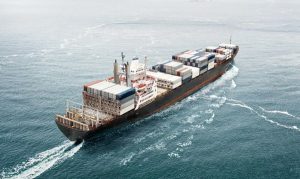Inga Beale, the Chief Executive Officer (CEO) of the specialist Lloyd’s of London insurance and reinsurance marketplace, has called for the re/insurance industry to step up to the challenges facing the cargo insurance industry, or risk losing out to new competitors.
 Research from Lloyd’s underlines the decreasing profitability of the cargo insurance segment, with combined ratios in the Lloyd’s market exceeding 100% in response to larger claims as a result of bigger ports, increased cargo volumes per ship, and also risk aggregation.
Research from Lloyd’s underlines the decreasing profitability of the cargo insurance segment, with combined ratios in the Lloyd’s market exceeding 100% in response to larger claims as a result of bigger ports, increased cargo volumes per ship, and also risk aggregation.
Addressing an audience at the International Shipping Week, Beale underlined challenges in the cargo industry, and rallied for the re/insurance industry to innovate and utilise technological advances to increase the profitability of the business line.
“If the insurance market doesn’t rise to the challenge then traditional players will lose market share to new competitors – like technology firms and asset managers – who are already investing and trying to capture market share from traditional underwriters. So it is important we get this right, not just for our own benefit, but more importantly for the benefit of our policyholders who rely on our insurers to pay out when disaster strikes,” said Beale.
The speech accompanies a new Lloyd’s report that explores new approaches to modelling cargo risk in light of the changing dynamics of the market. Cargo ships are now substantially larger than in the past and able to transport a significantly higher volume of cargo per trip, which increases the risk and subsequently results in larger average cargo claims, as highlighted by Lloyd’s.
Add to this the fact that larger volumes of cargo can concentrate in larger ports, which can then be hit by natural catastrophe events, as seen with Superstorm Sandy and the Tianjin port explosions, the risk aggregation element adds further complexity and potential loss for re/insurers.
In response, Beale explained how Lloyd’s is working with marine insurance firms and exploring new technology to improve the challenging cargo sector.
“We are exploring the possibilities new technology offers our sector, including artificial intelligence, data collection and analytics. By bringing together statistical forecasting methods, big data techniques, telemetry solutions and high resolution satellite imaging, a more realistic view of cargo exposures could be achieved, leading to better risk selection, which could help underwriters improve their overall profitability.
“Lloyd’s is working in partnership with a number of marine insurers to test the business impact of implementing a new smart data analytics platform for managing an insured vessel fleet,” said Beale.
Beale continued to explain that roughly 90% of world trade is carried by the global shipping industry, which highlights just how important it is that insurance and reinsurance companies better understand the risks and aggregation of exposures.
While technology can help to increase the efficiency of shipping, it also raises concerns about the potential for cyber threats, fuelling further uncertainty and complexity to the issue.
“For the insurance sector, we will need to continue to invest in innovative modelling, simulation, data collection and analysis to better understand the risks posed by these new technologies.
“Lloyd’s has been enabling human progress for more than three centuries, and we have no intention of slowing down now. I’m confident that, as we have always done, Lloyd’s will be ready to take on the new risks that tomorrow’s global shipping industry presents,” said Beale.


